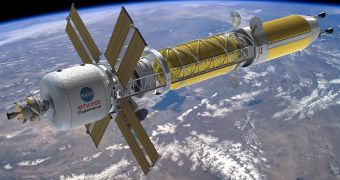Rockets aren't easy to build, the fact that the term "rocket scientists" is used to describe someone who's incredibly smart doing incredibly complex things, attests to that. But rockets aren't actually all that complicated and, in fact, haven't changed much for almost a century.
The essence is, put a lot of fuel in a tank, set it on fire and push it through a small nozzle to propel the rocket. The early rockets of the 20th century worked that way and the most advanced rockets of our day aren't all that different.
But that doesn't mean it's the only option, in fact, one of the more interesting and underdeveloped ones is nuclear power. Nucker rockets sound like something someone in the '50s thought would exist in the distant future, like the year 2000.
In fact, nuclear rockets have been around, in concept at least, since the 1950s. Much like regular rockets, nuclear rockets, or rather nuclear thermal rockets, aren't all that complicated.
They work on roughly the same principle, push something that really wants to get out though a really small hole. In this case, it's hydrogen heated up to huge temperatures by a nuclear reactor.
There have been many experiments and many designs, though no nuclear thermal rocket has ever launched.
Which is too bad since this type of engine has the capacity to be at least 2.5 times more efficient than existing chemical rockets, which means that it can lift roughly 2.5 as much cargo or just go much faster.
Crucially, a nuclear thermal rocket could get us to Mars or beyond much faster than it is currently possible, Jupiter in 2.5 years not six, Mars in three months not eight.
The last experiments with nuclear thermal rockets date to the 1970s, but there has been some renewed interest in the technology culminating with a new petition created via the White House's We the People website to spur development.
Granted, the petition only has a couple of thousand signatures and even if it had 10 times more, the goal needed for a response, it would probably not go very far.

 14 DAY TRIAL //
14 DAY TRIAL //